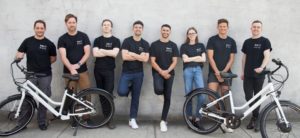California-based aerospace startup Venturi Astrolab has unveiled a prototype model of its brand-new interplanetary rover designed to transport cargo and people across the surface of the Moon and, eventually, Mars in the future.
Christened as Flexible Logistics and Exploration (FLEX), the rover, as the company says, the truck-sized rover can crouch down and lift payloads from the surface of the Moon, carrying them under its belly before depositing them at their intended location.
The rover is designed to support human operations, robotic science, exploration, logistics, construction and resource utilization. Astrolab says that this specialty of the rover would enable humans to make a sustained presence on the lunar surface and even on Mars.
Astrolab aims to create the most versatile rover ever created
Jaret Matthews, Astrolab’s founder and CEO, said, “We’re making FLEX to be the most versatile rover ever created, and the primary innovation is the fact that we have this modular payload capability.” The rover can carry a payload of up to 1,500 kilograms above or below its main deck and can be controlled either by two astronauts onboard or a remote.
The rover can maneuver semi-autonomously, be controlled remotely – or it can even be modified to include a crew interface, allowing astronauts to ride on the rover while guiding it through lunar terrain.
The startup claimed that when the rover is ready, it will weigh about 500 kilograms and be equipped with technologies specifically designed to operate in the lunar terrain.
FLEX would be made resistant to radiation and to temperatures that can drop as low as -130 degrees Celsius when the lunar south pole plunges into darkness for 14 days. The company is also working to make the rover withstand the extreme environment on the Moon.
According to the company, the FLEX rover would be delivered to the Moon before NASA’s Artemis 3 mission, targeted no earlier than 2025.
Currently, NASA sends the first woman and the first person of color to the Moon through the space agency’s Artemis program. Meanwhile, several space firms like SpaceX, Blue Origin, Astrobotic and Intuitive Machines are developing their own landers that will take people and cargo to the lunar surface.

































